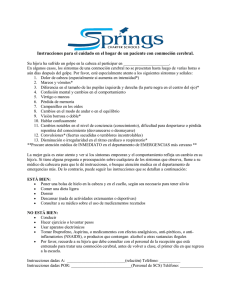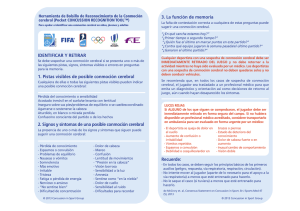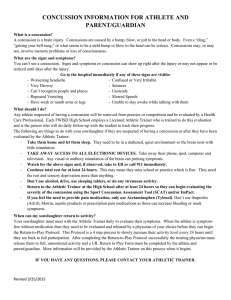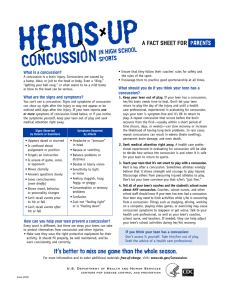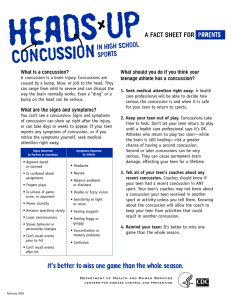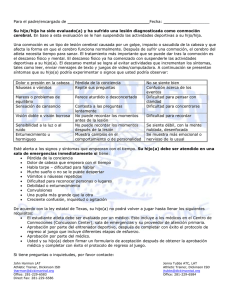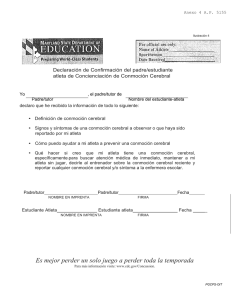CYO Concussion Information Sheet
Anuncio
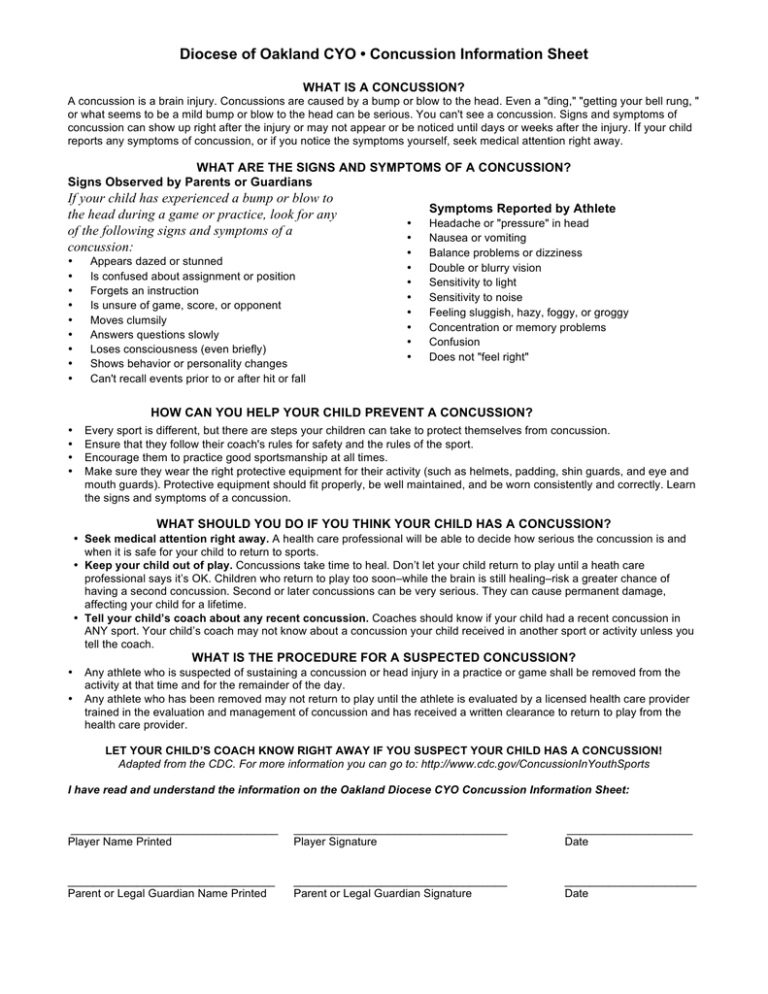
Diocese of Oakland CYO • Concussion Information Sheet WHAT IS A CONCUSSION? A concussion is a brain injury. Concussions are caused by a bump or blow to the head. Even a "ding," "getting your bell rung, " or what seems to be a mild bump or blow to the head can be serious. You can't see a concussion. Signs and symptoms of concussion can show up right after the injury or may not appear or be noticed until days or weeks after the injury. If your child reports any symptoms of concussion, or if you notice the symptoms yourself, seek medical attention right away. WHAT ARE THE SIGNS AND SYMPTOMS OF A CONCUSSION? Signs Observed by Parents or Guardians If your child has experienced a bump or blow to the head during a game or practice, look for any of the following signs and symptoms of a concussion: • • • • • • • • • Appears dazed or stunned Is confused about assignment or position Forgets an instruction Is unsure of game, score, or opponent Moves clumsily Answers questions slowly Loses consciousness (even briefly) Shows behavior or personality changes Can't recall events prior to or after hit or fall Symptoms Reported by Athlete • • • • • • • • • • Headache or "pressure" in head Nausea or vomiting Balance problems or dizziness Double or blurry vision Sensitivity to light Sensitivity to noise Feeling sluggish, hazy, foggy, or groggy Concentration or memory problems Confusion Does not "feel right" HOW CAN YOU HELP YOUR CHILD PREVENT A CONCUSSION? • • • • Every sport is different, but there are steps your children can take to protect themselves from concussion. Ensure that they follow their coach's rules for safety and the rules of the sport. Encourage them to practice good sportsmanship at all times. Make sure they wear the right protective equipment for their activity (such as helmets, padding, shin guards, and eye and mouth guards). Protective equipment should fit properly, be well maintained, and be worn consistently and correctly. Learn the signs and symptoms of a concussion. WHAT SHOULD YOU DO IF YOU THINK YOUR CHILD HAS A CONCUSSION? • Seek medical attention right away. A health care professional will be able to decide how serious the concussion is and when it is safe for your child to return to sports. • Keep your child out of play. Concussions take time to heal. Don’t let your child return to play until a heath care professional says it’s OK. Children who return to play too soon–while the brain is still healing–risk a greater chance of having a second concussion. Second or later concussions can be very serious. They can cause permanent damage, affecting your child for a lifetime. • Tell your child’s coach about any recent concussion. Coaches should know if your child had a recent concussion in ANY sport. Your child’s coach may not know about a concussion your child received in another sport or activity unless you tell the coach. WHAT IS THE PROCEDURE FOR A SUSPECTED CONCUSSION? • • Any athlete who is suspected of sustaining a concussion or head injury in a practice or game shall be removed from the activity at that time and for the remainder of the day. Any athlete who has been removed may not return to play until the athlete is evaluated by a licensed health care provider trained in the evaluation and management of concussion and has received a written clearance to return to play from the health care provider. LET YOUR CHILD’S COACH KNOW RIGHT AWAY IF YOU SUSPECT YOUR CHILD HAS A CONCUSSION! Adapted from the CDC. For more information you can go to: http://www.cdc.gov/ConcussionInYouthSports I have read and understand the information on the Oakland Diocese CYO Concussion Information Sheet: _________________________________ Player Name Printed __________________________________ Player Signature ____________________ Date _________________________________ Parent or Legal Guardian Name Printed __________________________________ Parent or Legal Guardian Signature _____________________ Date Diócesis de Oakland CYO • Información Sobre Conmociones Cerebrales ¿QUE ES UNA CONMOCION CEREBRAL? Una conmoción cerebral es una lesión cerebral. Las conmociones cerebrales son causadas por un golpe en la cabeza. Incluso un golpe leve en la cabeza puede ser grave. No se puede ver una conmoción cerebral. Los signos y síntomas de una conmoción cerebral pueden aparecer inmediatamente después de la lesión o pueden aparecer o ser notados hasta días o semanas después de la lesión. Si su niño presenta síntomas de una conmoción cerebral, o si nota los síntomas usted mismo, busque atención medica inmediatamente. ¿CUALES SON LOS SIGNOS Y SINTOMAS DE UNA CONMOCION CEREBRAL? Los signos observados por los padres o guardianes Si su hijo ha sufrido un golpe en la cabeza durante un juego o una practica, busque los siguientes signos y síntomas de una conmoción cerebral: • Luce aturdido o inconsciente • Se confunde con la actividad asignada • Se olvida de una instrucción • Se muestra inseguro del juego, la puntuación, o con miembro del otro equipo • Se mueve con inseguridad • responde a las preguntas muy lentamente • Pierde el conocimiento (aunque sea brevemente) • Muestra cambios de conducta o de personalidad • No puede recordar lo ocurrido antes o después de un golpe o una caída Los Síntomas reportados por el atleta • Dolor o "presión" en la cabeza • Nauseas o vómitos • Problemas de equilibrio o mareos • Visión doble o borrosa • Sensibilidad a la luz • Sensibilidad al ruido • Se siente débil, confuso, o aturdido • Problemas de concentración o de memoria • Confusión • No se siente "bien" ¿COMO PUEDE USTED AYUDAR A SU NIÑO A PREVENIR UNA CONMOCION CEREBRAL? • • • • Cada deporte es diferente, pero ay pasos que sus hijos pueden tomar para protegerse de una conmoción cerebral. Asegurarse de que siguen las reglas de su entrenador para la seguridad y las reglas de el deporte Animarlos a practicar el buen espíritu deportivo en todo momento. Asegurarse que utilizan el equipo de protección adecuado para la actividad (como cascos, almohadillas protectoras, canilleras y protectores para los ojos y la boca). Equipo de protección debe ajustarse adecuadamente, mantenerse en buen estado, y ser usados correcta y consistentemente. Conozca los signos y síntomas de una conmoción cerebral. ¿QUE DEBE HACER SI PIENSA QUE SU NIÑO TIENE UNA CONMOCION CEREBRAL? • Busque atención médica inmediatamente. Un profesional de salud tendrá la capacidad de decidir la gravedad de la conmoción cerebral y determinar cuando sea seguro para que su hijo vuelva a practicar deportes. • Mantener a su hijo fuera de juego. Las conmociones cerebrales toman tiempo para sanar. No deje que su hijo vuelva a practicar deportes hasta que un profesional de la salud ha determinado que es seguro hacerlo. Los niños que han vuelto a jugar demasiado pronto--mientras que el cerebro sigue en la recuperación--aumentan la probabilidad de tener una segunda conmoción cerebral. Contusiones segundas pueden causar daños permanentes, afectando a su hijo para toda la vida. • Informar al entrenador de cualquier conmoción cerebral reciente. Los entrenadores deben saber que su hijo sufrió una conmoción cerebral recientemente en CUALQUIER deporte. El entrenador de su hijo puede no saber acerca de una conmoción cerebral que su hijo recibió en otro deporte o actividad a menor si usted no le dice. ¿CUAL ES EL PROCEDIMIENTO PARA LA SOSPECHA DE UNA CONMOCION CEREBRAL? • Cualquier atleta que se sospecha de sufrir una conmoción cerebral o lesión en la cabeza en una practica o juego deberá ser retirado de la actividad en ese momento y durante el resto del día. • Cualquier atleta que ha sido removido no podrá volver a jugar hasta que el atleta sea evaluado por un médico profesional licenciado, entrenado en la evaluación de una conmoción cerebral. El atleta debe recibir una autorización por escrito para volver a jugar del el proveedor de atención medica. INFORMAR AL ENTRENADOR DE SU HIJO INMEDIATAMENTE SI USTED SOSPECHA QUE SU NIÑO TIENE UNA CONMOCION CEREBRAL. Adaptado por el CDC. Para mas información puede dirigirse a http://www.cdc.gov/ConcussionInYouthSports He leído y entiendo la información en la hoja de información de la Diócesis de Oakland sobre Conmociones Cerebrales. _____________________________ _________________________ ________________ Nombre de jugador (letra de molde) Firma de jugador fecha ________________________________ Padre o Guardián Legal (letra de molde) ____________________________ Firma de padre o Guardián Legal _________________ fecha
